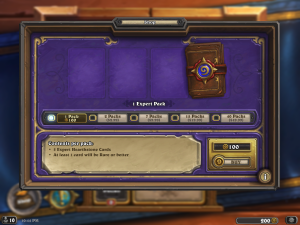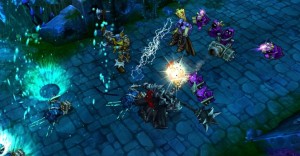With my continued failed attempts at getting into Hearthstone, I feel myself getting tired of it. But thinking about it more, I’ve come to realized that I’m just not a fan of Free to Play games or free to play design philosophy as it goes against one of my main attitudes as a gamer.
Owning vs. Renting:
This thought goes back to an earlier post I wrote about the power of ownership has when it comes to buying content. There is a big difference between saying that you own something vs. you are only renting it or have access for a short time.
When you look at most Free To Play games, they are designed around “renting content” as a means to keep consistent purchases going. This could be in the form of having a monthly fee for special access, premium currency or pay and wait design in a lot of social games.
The point is that any of these purchases don’t give the player anything permanently and eventually they will have to spend money again and again. I know that’s the mentality and sales process that goes into F2P design and what the fan base likes. But for me, I already dealt with this in the 80s and 90s under its original form — The Arcade Industry.
Quarter Crunching for the New Millennium:
When I think of the mentality of renting access to play a game, it reminds me of the arcade industry. Arcades were designed the same way as F2P games are today around renting access that’s gone the moment you run out of money or in game currency.
As you can guess, I wasn’t a big arcade fan either back in the day for the same reasons I don’t like F2P today. If I’m going to spend money on something, I want to get something of quality with my purchase. The thought of throwing money at something to give me a few minutes of enjoyment just doesn’t work for me.
With Hearthstone, every arena run has ended the same way: I throw my money at it, lose twice in a row and get so disgusted that I resign and I’m left sitting there worse off than I was before. Also when I was first starting out, I wasted a lot of my gold rewards on cards that turned out to be the wrong ones to go for after speaking to my friends, further wasting time and money at the game.

Hearthstone like most F2P games has its primary means of monetization around constant small purchases as opposed to qualitative purchases.
One element that I can really appreciate from Valve with their repeated purchase for Mann Up tickets in Team Fortress 2 is that the ticket is only consumed on victory.
So I could play it as many times as I want until I win which incidentally is just like those crane machines that are priced higher but have a guaranteed win to them. If I feel like I’m wasting both time and money at something, then there is just no enjoyment there for me.
This is also how I avoided the MMO craze of the last decade for the most part. The last MMO that I actually subscribed to was City of Heroes back in the early 00s and that was only for less than a year.
What’s interesting about this buying vs. renting mentality is that the market has already decided that they prefer buying when it comes to games in the grand scheme of things.
The Decline of the Rental Market:
Game rentals were a lucrative business back in the 80s to early 00s. Due to the high cost of buying video games, stores like Blockbuster made a killing renting games for a fraction of the cost. Why spend $60 on a game when you can play it for $10 for five days?

What made LOL work so well was that the main purchases for the game were all about unlocking content that had value to it, while the rest of the game was free.
For many of us, we could finish the game in that time and essentially get our money’s worth at a much lower cost.
But what we saw over the last decade was a gradual decline and almost complete extinction of the rental model. First was the rising focus on digital content, either with buying whole games or having DLC. Attaching your game and content to your account gave you more value for these titles and made it harder to rationalize renting a game when there was additional content to buy.
The devaluing of games was another huge deal. Thanks to sales and the surge of Indie games, it was a lot easier and cheaper to play video games than it was in the 80s and 90s. Now, you could buy games for $10-$15 and that was a lot more appealing than renting a game for about the same.
Services like Redbox are making do by allowing you to rent games for a lot cheaper and then charging you for additional day rentals. So you could play a new game for $2 and take it back the next day. But still, the market has transitioned into lower prices and more value.
Bang for your Buck:
Ultimately when I spend money on a video game, I want to make sure that I’m getting something of value with that purchase and not just throwing it into the ether. It’s why I happily bought the DLC from Payday 2, Mann Up tickets and even spent money on custom skins for both League of Legends and Card Hunter.
And this is also why I have no intention of spending any money on Hearthstone or games like it. Talking on the podcast this past week, James brought up an interesting point about what they did with DC Universe Online and how they upgrade someone’s account based on how much money they spent on the game.
So that buying the expansions/DLC gave you more value compared to the old MMOs where $15 a month just gave you access and that’s it. That to me is a good compromise: if the game tracked how much money I was spending on it and gave rewards based on my amount spent, it would be a better alternative than just spending it on repeated purchases.

Constant purchases like this, turn me off of Free To Play games as they don’t add any real value to the game and are just there for monetization purposes.
As more and more games are being released at lower price points, F2P games will not just have to base their microtransactions on other F2P games, but also on discounted titles.
We’ve seen the social game market crash already and with so many developers moving to F2P design, I wonder if F2P games are next on the list.


